2009
End of an Era
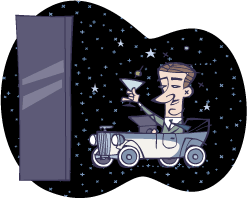
Has it really been a decade already? 2009 is on the way out and 2010 looms, or beckons depending on whether it’ll be half empty of half full. Folks hither and thither are assembling their top tens of the decade. I’ll not buck the trend by offering you the…
Top 10 Years of the Decade
- 2001
- 2004
- 2005
- 2000
- 2007
- 2002
- 2006
- 2003
- 2009
- 2008
Some joke, huh? All the sports fan in me can say is, wait until next year.
Filed 12/30/09
Bigger and Less and Better?
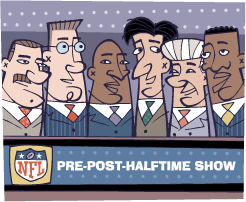






Click on the pic to “hear” the insightful commentary.
What’s with the proliferation of talking heads on the NFL pre-game shows? Do we really need a bar-length desk of five or more ex-jocks and retired coaches jawjacking about the games? What do they propose is gained by having so much overlapping cross-talk of big men in tight suits?
Maybe it’s a sign of the modern audience’s short attention span where we can’t listen to one mouth more than the length of an extended sound bite. Perhaps the ever increasing line-ups are simply a way of filling up the new wide-screen format of DTV.
Filed 12/19/09
Are Pirates Sea-lubbers?

Movie pirates call folks landlubbers. Being a landlubber and not a pirate I can’t tell you what lubbing is. Perhaps the folks at the Official Talk-like-a-pirate Day site can tell you what that’s all about. Though I haven’t a clue about lubbing, I can tell why pirates go around saying “Avast, ye maties!”
avast (ə văst′) interj. A nautical command to desist. [Shortened from the Dutch houd vast, hold fast.]
Why avast and not simply stop? Who knows? Sailors have a language all their own.
Filed 12/3/09
Russian Dark Humor
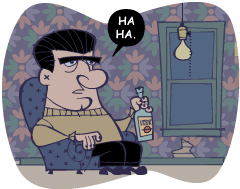
When the Soviet Union fell apart Communism was replaced with… I don’t know what you’d call it, but the Russian president is the former head of the KGB. This might amuse them in some ironic sort of way because it seems one thing that hasn’t changed is the Russians’ dark sense of humor. For instance, here’s a pair of Russian gags from back in the USSR:
What is 150 yards long and eats potatoes?
A Moscow queue waiting to buy meat.
The government pretends to pay us, and we pretend to work.
Now one of more recent vintage:
To save energy, the light at the end of the tunnel will be turned off.
Filed 11/8/09
Ye Olde List

Ten Signs You Might be Getting Old
- Boy scouts often offer to help you cross the street.
- Your childhood items show up on Antiques Roadshow.
- You go home at the time you used to go out.
- You buy clothes for comfort rather than style.
- You don’t need to show ID to buy booze, or to get a senior citizen discount.
- ”At the turn of the century” is 1900, not 2000.
- Every new person you meet reminds you of someone you used to know.
- Hair grows everywhere except on top of your head.
- ”Wait ’til next year” doesn’t seem that long a wait.
- You don’t trust anyone under thirty.
There are signs within the signs that you might be getting old. On number two, that you watch Antiques Roadshow might be a sign. On number ten, that you know this is a play on the phrase “never trust anyone over thirty” popularized by 1960s era hippies might be a sign.
Another sign, when perusing the magazine rack you don’t know who any of the younger celebrities on the covers are. Not only don’t you know if Lady Gaga is a man or a woman, you never even heard of Lady Gaga. Lastly, that you read this bit on signs you’re getting old and could relate could be a sign you might be getting old.
Filed 10/30/09
Good Humor, Man

The picture above makes sense when you are familiar with the old-time idea of good health being a balance of the four humors. These ancient humors are bodily fluids, namely phlegm, blood, yellow bile and black bile. An imbalance of any of these was thought to cause a disposition and where we got the following words:
phlegmatic (fl mă′-tĭk) adj. Lazy. [phlegm]
sanguine (săn′ gwən) adj. Happy. [blood]
bilious (bĭl′ ē-əs) adj. Irritable. [yellow bile]
melancholic (mĕl ən kŏ′-lĭk) adj. Sad. [black bile]
Another word for bile is choler, and so we get another word for bilious:
choleric (kō lêr′ ĭk) adj. Irritable.
To choler you add melan, which means black, and you get melancholic. The others don’t make for good combinations. There is no phleguine, sangcholic, melanphlegmic, phlegmcholic or even melansangmatic.
Filed 10/15/09
You Can’t Mine Electricity

Even though we use electricity, rarely do we use it directly as electricity. By which I mean electricity is converted to some other type of energy to be usefull to us. Such as coverting it to light energy with a lightbulb or computer screen. Or to mechanical energy with a motor as in a fan, pump or compressor. Or to sound waves with a speaker. Or to heat energy with a stovetop or oven.
Thing is, there are no direct sources of electricity, no vast electrical fields or reserviors that can simply be tapped into. Electricity must be generated. You could say electricity is a way to transport energy. It begins as mechanical or heat energy, flows to your home as electricity and is converted to light, heat, mechanical, or whatever energy that you can actually use. Without it we’d be back to fireplaces, candles, hand cranks and wind-up springs. Or maybe lots of little steam engines on every appliance.
Filed 10/6/09
Plays to Drive Fans, Managers, Umpires and Official Scorers Crazy

The playoffs and World Series are just around the corner. Who will take the home the glory, what can we expect? I don’t know, but likely as not there will be a weird play or controversy of some kind. When the unusual happens umpires are expected to make the right call on the spot. Afterwards official scorers must determine what that means stat-wise.
One of the most famous goofy plays was the fly ball bouncing off Jose Canseco’s head over the fence for a homerun. Below are two odd moments in baseball I personally remember happening to the Detroit Tigers.
Grand Slam Out?
The bases are loaded with less than two outs. Dalton Jones hits a long, high fly ball to right that looks like it might go out, or might be caught. The baserunners hold up between bases waiting to see. Jones heads to first while also ball-watching. The ball clears the fence, the first base umpire signals homerun. But in his excitement Jones running full out rounds first and passes the runner who was on first before either reach second. The second base umpire calls Jones out for passing the runner.
Questions: What’s the umpire’s call from here? Do the runners score or what? What’s the official scorer’s call? Is it a homerun or what?
Inside the Infield Homerun?
Bases empty, two outs, Earl Wilson at the plate with two strikes. Low pitch comes in, Wilson swings and misses, the catcher traps the ball. Strike three! The catcher lobs the ball towards the mound and the fielders head off the field. Wilson pauses in the batter’s box for a moment and then walks towards first base. At this point only he and the umpires realize he is not out because the third strike was not caught cleanly, in which case the batter must be tagged or thrown out at first.
The ball comes to rest past the mound and the fielders are in the dugout. Wilson starts running the bases. Seeing this, the opposing team fielders realize their mistake and scramble out to make a play. It’s a race to fetch the ball and throw out Wilson before he gets home. One player heads for the ball and a group go to cover the plate. If this wasn’t comedic enough, it gets more absurd when Wilson falls rounding third and hurts himself. The ball has been retrieved, Wilson gets up and tries to hobble back to third, but is run down and tagged out.
Questions: For the umpire it’s simple, he’s the third out, inning over. Or is he? Can players come out of the dugout and make a play? What’s the official scorer’s call?
Answers
As I said, these two plays actually happened to the Tigers many years ago. I hope I remember the details correctly from listening to them on the radio. Though in scenario two there was no play-by-play as the broadcast crew also thought the inning over and went to commercials. The announcers related the events after coming back.
Play One: All three runners scored and Jones got credit for a single and three RBIs, as well as an out running. (Who, if anyone, got credit for a putout, I don’t know.)
Play Two: Earl Wilson was credited with a three base error on the catcher, and an out running. Players in the field can go into, then out of the dugout to make plays. The putout would be scored as usual, 1-2-?-? depending who fetched the ball and who tagged Wilson out. Had he actually made it all the way, I’m pretty sure it would have been the only four base strikeout in baseball history.
Filed 9/30/09
Houston, what’s the problem?

Q: What’s the most over-rated thing ever?
A: It’d have to be landing a man on the moon. How often have you heard someone say, “We can land a man on the moon, but we can’t… fill in the blank with your major concern or pet peeve.” Which means either we’re real slackers about a lot of things or landing a man on the moon wasn’t all it’s cracked up to be.
On second thought, perhaps the most over-rated thing is sliced bread. Consider all the things that are the best things since sliced bread, as if it were the benchmark to which all things are compared. But, c’mon, what’s so great about it? Taking a knife and cutting through bread is not exactly rocket science, is it?
Filed 9/14/09
Why Model Ts Only Came in Black

“You can have any color you want. As long as it’s black.”
This is what Henry Ford said about his offering of the Model T in black and nothing but. Luckily for him, and for customers, people like black. Still, one wonders, why did the Model T come only in black. Was Ford arrogant and indifferent to customer demand? Actually, it had to do with Ford’s business model and the state of paint technology at the time.
Back then there weren’t a lot of specialized automotive paints like today and they didn’t bake the paint finish. Black auto paint air-dried more quickly than other colors of the day. On a hot, dry summer day that’s no issue. In a Detroit winter, that’s another story.
Ford’s business model was mass-producing cars at lower costs. Only the black paint available then dried quickly enough to keep assembly lines moving along without huge storage facilities for paint drying. This reduced costs.
Was Ford indifferent to customer demand? Not really. When customer demand is for cheap and reliable, variety of color is of less concern. That’s what customer preference is about. Prefer cheap, get a Ford. Prefer colorful, buy a Rolls.
Filed 9/1/09
Nobody Expects a Paradox
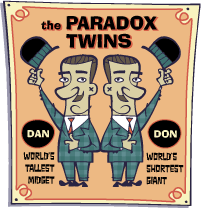
paradox (pâr′ ə-dŏks) noun. 1. A seemingly contradictory statement that may nonetheless be true. 2. A person, situation, or action exhibiting inexplicable or contradictory aspects. 3. An assertion that is self-contradictory, although based on accepted premises.
Sometimes people speak of paradoxes in science or medicine. For instance the French paradox, where the French eat the most saturated fat but have the least heart disease in Europe.
A paradox can’t really exist in reality, but only in the mind. Forces of nature can’t act against their own properties. An unexpected result can’t be an incorrect result, but rather an incorrect expectation. Which means either the test was flawed or the underlying premise was wrong. So if you change your expectation the paradox vanishes even though the results are the same.
Filed 8/3/09
Why Type Comes in Upper and Lower Case

Upper case and lower case are pretty well-known terms for anyone dealing in type or the written word. You know, CAPITAL LETTERS and non-capital letters. Have you ever wondered where those terms come from, what they refer to? Here’s the answer whether you’ve ever wondered or not.
It all goes back to the big breakthrough in printing, moveable type. Gutenberg’s big invention was not the printing press itself, but standardized, individual letters on little metal blocks that could be assembled into any text. This way you could print a Bible or a do-it-yourself book with the same bits by rearranging them without having to start over from scratch.
These letters were stored and organized in wooden cases with a series of partitions making cubby holes for each particular letter. These were standardized so typesetters could find what they needed with all the capitals in the upper part and all the non-capitals in the lower part. Hence upper and lower case.
Now a bit of minutiae you may not have considered. If you’ve played around with typefaces you may have noticed some fonts look smaller at the same point size compared to other fonts. That’s because they are, even though they ain’t. Which sounds like gibberish, but I can explain.

Above are the letters “L, x, p” in 80 point type. The first font is Humanist and the second is Helvetica. As you can see, if you set them on the same base line both the upper case and the lower case letters are taller in Helvetica. But point size isn’t measured that way. It goes from the bottom of the descender, the tail of the “p” to the top of the ascender, the top of the “L.”

When you line them up like that, they are the same size. You will notice the lower case “x” in each are different sizes. This is called the x-height. A typeface with a smaller x-height will look, or read smaller than a font with a bigger x-height even when they’re the same point size.
If you’re interested, you can read about the another built-in optical illusion of type here.
Filed 5/11/09
The

Social Security began in 1935 and Ida May Fuller of Ludlow, Virginia was the first to receive monthly Social Security benefits. Retiring at the age of 65, she began collecting checks in January 1940. Ida paid a total of $24.75 into the system and lived to be 100 years old. During her lifetime she collected $22,888.92. Which might not seem like a lot, but it represents a 90,000% return on her “investment.”
In a strange way you might think of Social Security as reverse inheretance. Instead of the older generation providing for the younger, it’s the other way around.
Filed 4/14/09
Holy Boatmobile!

Eight Ways for Detroit Auto Makers to Bail Themselves Out
- Cut labor costs by selling cars as do-it-yourself kits.
- Rename companies in successful sounding Japanese style to General Moto, Fomocohama, and Karisera.
- Resurrect glory days when Detroit was king – FINS!
- Outcompete everyone on price by building used cars.
- Hire infomercial king Billy Mays. He can sell anything. Act now!
- Multi-level marketing. Forget about selling cars, sell dealerships.
- Sell out to China and let them worry about it.
- Hire charismatic economic wizard Bernie Madoff and… wait. Never mind.
Filed 4/8/09
Ar-r-r, Decimatie
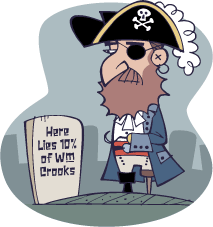
decimate (dĕs′ ə-māt) tr. verb. 1. To destroy or kill a large part of. 2. To select by lot and kill one in every ten of.
The second definition explains the origin of this word, from Latin decimus, one tenth. It was a practice of the Roman army to punish units for cowardice in battle by decimating it. That is, taking one in ten and executing them.
Filed 4/2/09
Odd Chance
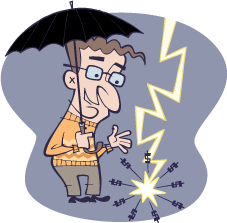
Q: I’ve heard you’re more likely to be struck by lightning ten times than to win the lottery. Yet people win the lottery all the time, but I don’t hear of anyone getting hit by lightning ten times. What gives?
A: That’s because they’re calculating the odds of a single ticket winning the lottery. But who buys just one ticket? Thing is, you can increase your chances of winning by buying more chances.
Say to win the lottery you need five correct numbers from 1 through 40. Your chance of winning is one in 78,960,960. That’s pretty long odds. If you buy ten tickets you improve your chances to ten in 78,960,960. If you buy 100 tickets… you get the idea.
On top of that, you aren’t the only one playing the lottery. If ten million people each buy ten tickets the odds that there will be one winning ticket are about 100,000,000 in 78,960,960. Better than even odds that someone, though probably not you, will win.
I don’t know what the odds of getting struck by lightning ten times are, but you can’t increase the chances unless you create more of yourself. If there were a thousand you clones, the chances go up. But that’s you as a collection, not a single you or any one of your clones. Either that or you have to be in a thousand places at once. What are the chances of that?
Then again, the first lightning strike may kill you. Then you’d be dead and buried or cremated. Which would make another bolt hitting you pretty unlikely.
Filed 3/25/09
The Mismanagement Apologizes for Any Confusion

“Doing it right is no excuse for not meeting the schedule.”
Or so said a plant manager for Delco Corporation. Yessiree, bob, people say some mighty strange things. This came from a list of real-life Dilbert manager quotes. My dad had another version of this idea when clients seemed obsessed with deadlines above all else:
“There’s never time to do it right, but always time to do it over.”
The winner of the dumbest real-life Dilbert manager quotes comes from Microsoft’s Fred Dales:
“As of tomorrow, employees will only be able to access the building using individual security cards. Pictures will be taken next Wednesday, and employees will receive their cards in two weeks.”
Makes you wonder if these people have a good grasp of time management. Or of time, period.
Filed 3/17/09
How to Sound Funny on Film

Burping, farting, sneezing and snoring are just plain funny to people of every stripe the world over. What can we take away from that? I suppose, if some body function makes a noise, funny. If it doesn’t, not so funny. Basically, sound effects are funny.
The Three Stooges applied this principle with a vengence. I mean, without those goofy sound effects they’re just a trio of morons abusing each other. If a hammer blow to the head made a thudding, skull-crushing sound it’d be disturbing. But a hammered noggin that clangs like a bell is a laugh riot. A poke in the eye isn’t funny unless it goes “plint.”
One imagines sound effects were why jesters had bells on their hats. Nodding made them jingle as if their brains were little peas in their skulls. Maybe.
Filed 3/10/09
Now and Then
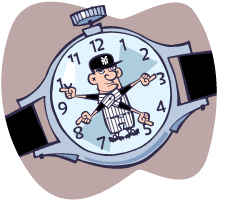
presently (prĕz′ ənt-lē) adverb. 1. In a short time; soon. 2. At this time or period; now.
Either the word means real soon or right now. Which seems rather at odds with itself. As The Man in Cool Hand Luke said, “What we have here is failure to communicate.” So, if you don’t understand it presently, read on and you might understand it presently. Make sense?
It all depends who you ask. Three quarters of usage authorities prefer the first definition. While about 50% say the second is OK. Which adds up to 125%. I can only suppose what we have here is failure of arithmetic or some kind of Einsteinian Relativity.
Which calls to mind an exchange between Mickey Mantle and Yogi Berra.
Mantle: “Yogi, what time is it?”
Berra: “You mean right now?”
Filed 3/4/09
Monkeying Around

“We’ve all heard that a million monkeys banging on a million typewriters will eventually reproduce the entire works of Shakespeare. Now, thanks to the Internet, we know this is not true.” —Robert Wilensky
Filed 3/2/09
Gas Gives the Biggest Bang for the Buck

Pound for pound, gasoline contains 15 times more energy than TNT. Which might not be the main reason we don’t drive TNT powered cars, but it’s a good one.
Perhaps you’re wondering how that compares to, say, the high-quality batteries used in cellphones and laptops? Batteries have only 1 percent of the energy of an equal weight of gas. While they’re rechargeable, they typically die after 1,000 charges. If you include the cost of recharging and replacement, they’re more expensive to use than gasoline.
Maybe you’re thinking hydrogen fuel has more energy per pound. It does, but less per gallon. In liquid form hydrogen has 25% as much energy per gallon as gasoline, though it weighs less. However, to be liquid hydrogen must be kept at -253° Celsius (-423° F). Not very convenient.
The biggest problem with hydrogen, it can’t simply be pumped out of the ground. There are no easily-had supplies of the stuff, it has to be manufactured either from water by electrolysis or from natural gas. With electrolysis you can only get back the same energy you put in. This makes a fuel-cell car similar to a battery powered car, it has to be charged up.
By contrast, the energy in gasoline is built-in when you get it out of the ground. That’s why gas is so cheap and easy to use.
Filed 2/5/09
Thanks for Nothing

Arabic numerals are not Arabic. Though Europe got these symbols from the Arabs, they in turn got them from India. The concept of zero, a symbol for nothing or an empty set, also began on the subcontinent. The zero was the greatest idea since 1+1=2, and makes modern math possible. Imagine doing simple arithmetic and calculations with Roman numerals.
|
VII |
7 |
Now try using Roman numerals to multiply and divide, do calculus, or simply balance your checkbook. In fact, just try writing two thousand fifty-eight without a zero and you can see how cumbersome it can be.
To give credit where credit is due, they should rightly be called Sanskrit numerals. All thanks to some anonymous Indian a long, long time ago.
Filed 1/14/09
Believing Everything and Nothing
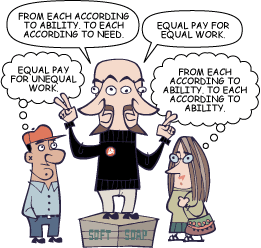
doublethink (dŭ′-bəl thĭnk) noun. The ability to simultaneously know and not to know, to be conscious of complete truthfulness while telling carefully constructed lies. To hold simultaneously two opinions which cancel out, knowing them to be contradictory and believing in both.
Doublethink comes from George Orwell’s great dystopian novel 1984. These days we use the phrase cognitive dissonance, but doublethink is better in my opinion.
Filed 1/12/09
In the Beginning Was the List
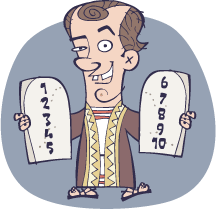
They say one of the best ways to get links to a blog or website is by posting lists. Why are lists so popular? Let’s see…
Top Ten Reasons We Like Lists
- Easy reading
- Easy counting
- Don’t challenge our attention span
- Don’t require writing in complete sentences
- Require no explaining*
- We like ranking things one to ten
- We like arguing about rankings one to ten
- To know what to get at the grocery store
- Can seem funny when they aren’t
- Two words, David Letterman
* Sometimes lists do require explaining, for which we have asterisks.
11. We like adding our own entries to them
Wouldn’t you know it would eventually come to this? Top 10 Top 10 Lists of 2008
Filed 1/9/09